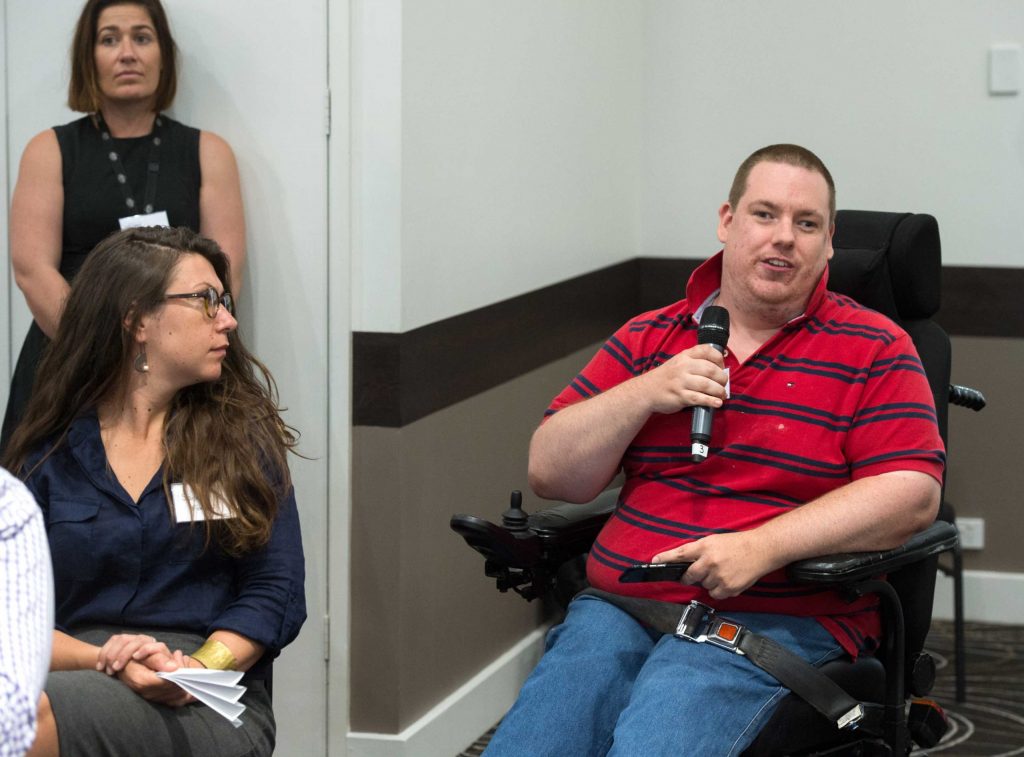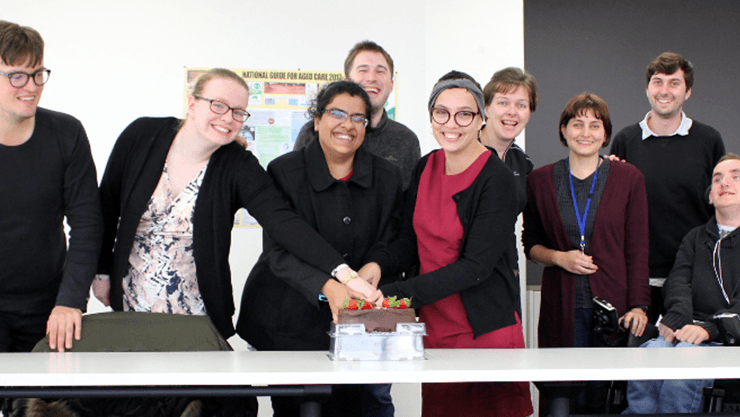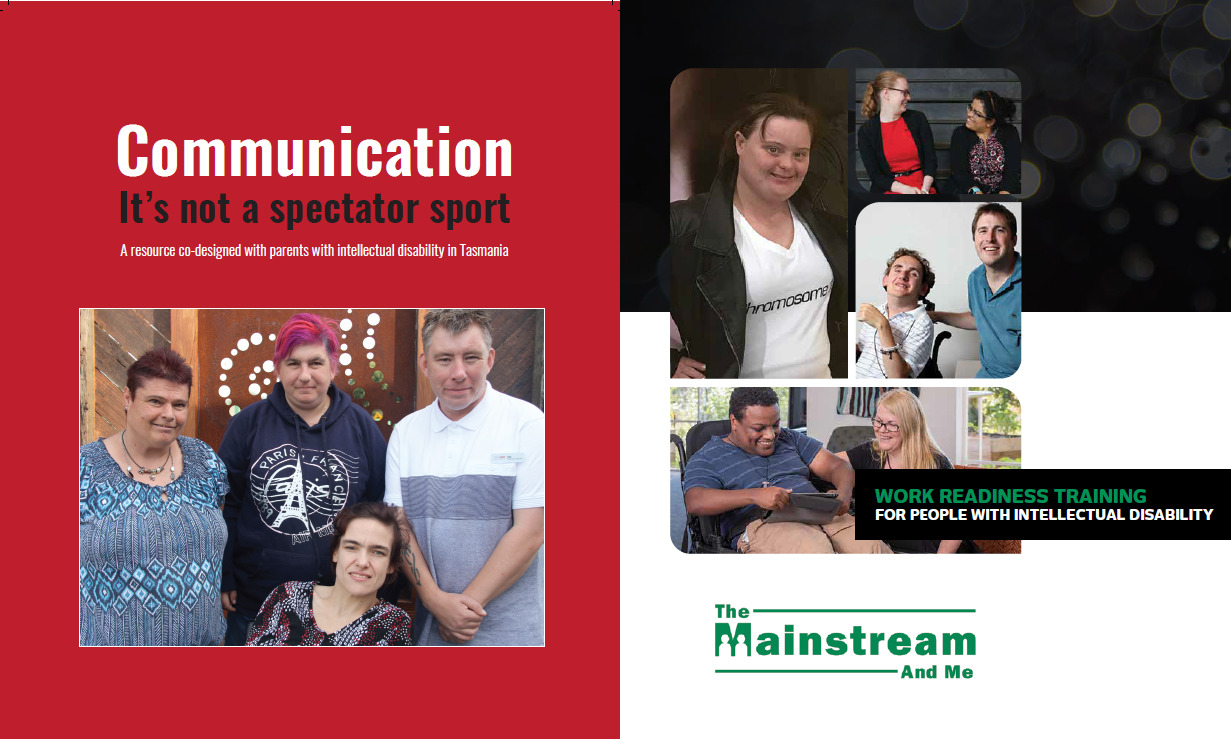Mainstream and Me

Background
People with an intellectual disability seeking access to mainstream services often can’t get the support they need and have to navigate inaccessible systems.
We wanted to increase the confidence of organisations and businesses in hiring people with an intellectual disability. We wanted to educate them about some of the barriers people with an intellectual disability can face.
The project was also about building the capacity and confidence of people with an intellectual disability to seek mainstream opportunities for themselves and to achieve positive outcomes.
Mainstream and Me was funded by an Information, Linkages and Capacity Building (ILC) grant from the NDIA. It was run in partnership with four of our state and territory member organisations including CID, VALID, Parent 2 Parent and Speak Out.
Each organisation focused on a different area:
- CID (NSW) – building capacity and promoting inclusive practice and community building with peer community educators as the leaders.
- VALID (Vic) – educating communities of the challenges people with a disability face when accessing the community, with a focus on inclusion in the sport, leisure, arts, tourism and recreational sectors.
- Parent 2 Parent (QLD) – promoting inclusive and innovative employment opportunities across different sectors with peer community educators as the leaders.
- Speak Out (Tas) – connecting parents with an intellectual disability with mainstream service provision and educational programs and delivering workshops to providers.
You can watch a video about the Mainstream and Me project here:
What we did
In partnership with state members, we trained 25 people with an intellectual disability to become Peer Community Educators.
The Peer Community Educators delivered workshops to mainstream service providers, employers and businesses within their local communities.
The information delivered was designed to:
- increase the confidence of communities to hire people with an intellectual disability and how to support them.
- challenge assumptions that people hold about people with an intellectual disability through education and awareness.
- develop networks by building and maintaining sustainable relationships with people with an intellectual disability.
- develop strategic partnerships with local and state organisations and businesses.
In 2018, Peer Community Educators delivered 76 workshops across metro and rural and remote areas of New South Wales, Victoria, Queensland and Tasmania. 265 organisations were reached and over 2,000 people attended the workshops.
Inclusion Australia Policy Officer and VALID member, Luke Nelson was part of the Mainstream and Me project.
Luke said, “My specific project is working with local libraries and Neighborhood Houses in Yarra Plenty and Watsonia to create resources to support staff to better include people with disabilities and to develop a range of new programs and services. Libraries are already great places but Mainstream and Me is about making them even more accessible and friendly to people with disability”.

The Peer Community Educators also presented at several national events including Inclusion Australia’s National Employment Forum, the NDIS CEO Forum and the NDIA Partners Quarterly Meeting in Melbourne.
The impact of Mainstream and Me
Through this project, we:
- increased awareness around why people with an intellectual disability have trouble accessing mainstream services and addressing stereotypes by offering different perspectives.
- built the capacity and confidence of people with an intellectual disability to feel supported and empowered to seek mainstream service opportunities for themselves.
- developed the tools, skills, and knowledge of people with an intellectual disability to work together with other people in the community.
- educated mainstream services through the lived experience of people with an intellectual disability about inclusive workplaces and inclusive practices.
- co-designed training resources to be participant centred.
What we found out
Some of the things we found out in this project were:
- community development frameworks have the potential to make significant social and cultural change.
- people with an intellectual disability delivering information to employers can increase their confidence in navigating issues of employing people with disability.
- delivery of workshops was a good starting point for encouraging mainstream services to reconsider how their business and services can benefit from more inclusive practices and engagement in community development opportunities.
- local capacity building and change needs to be supported by the states and nationally to create long term, sustainable change.
Read the full report, which includes the outcomes, impacts and recommendations here: Mainstream and Me project report.
Some of the Mainstream and Me workers from CID reflected on what they achieved in the project.
Steph said, “I feel like I made a positive influence in other people when I shared my story” and “I have grown and developed over the last six months.”
Ella said, “We are finally being heard and are spreading the word.”

Some of the member organisations were able to retain Peer Community Educators to continue working for them. Each organisation continues to explore opportunities within their areas to build upon the foundations Mainstream and Me provided.
Resources

Communication is not a spectator sport is a resource co-designed by parents with an intellectual disability in Tasmania. It focuses on accessible information and communication. It provides strategies to help ensure information is presented in a way that parents can understand and that they are given a chance to express their views.
Work readiness training for people with intellectual disability is an employment and training manual to deliver the Mainstream and Me program.
